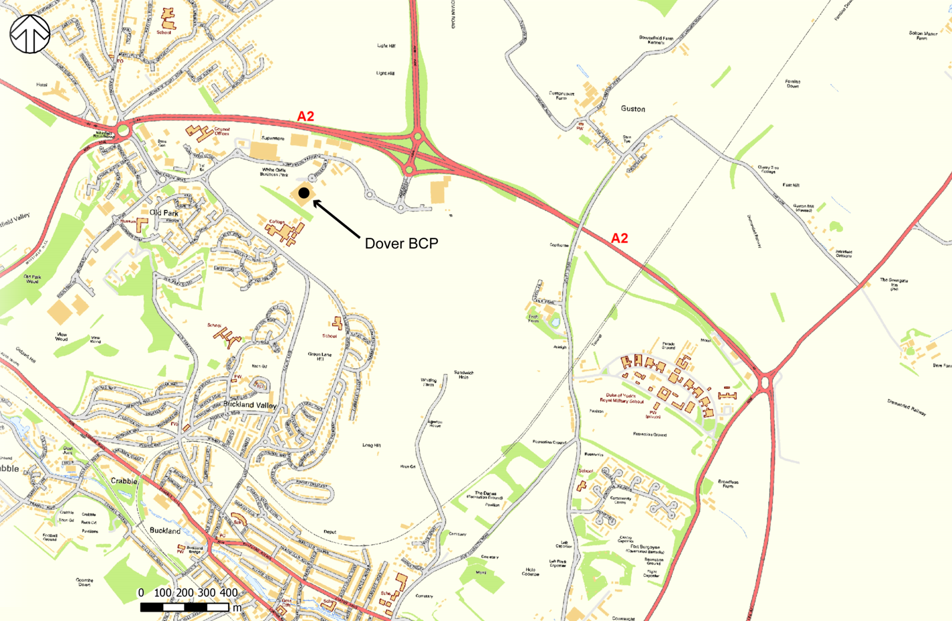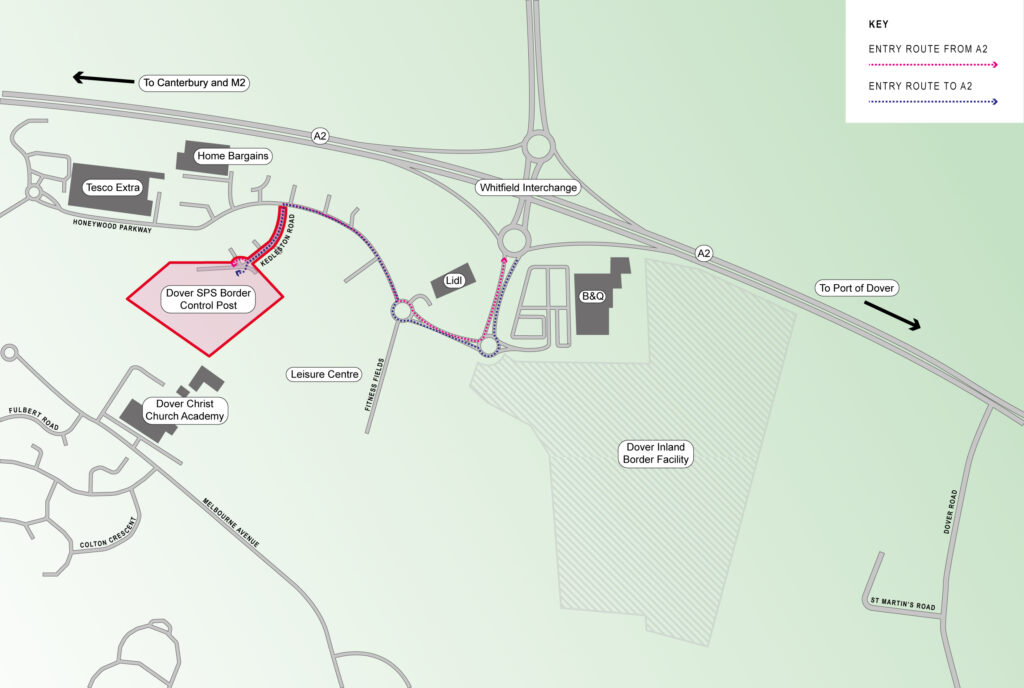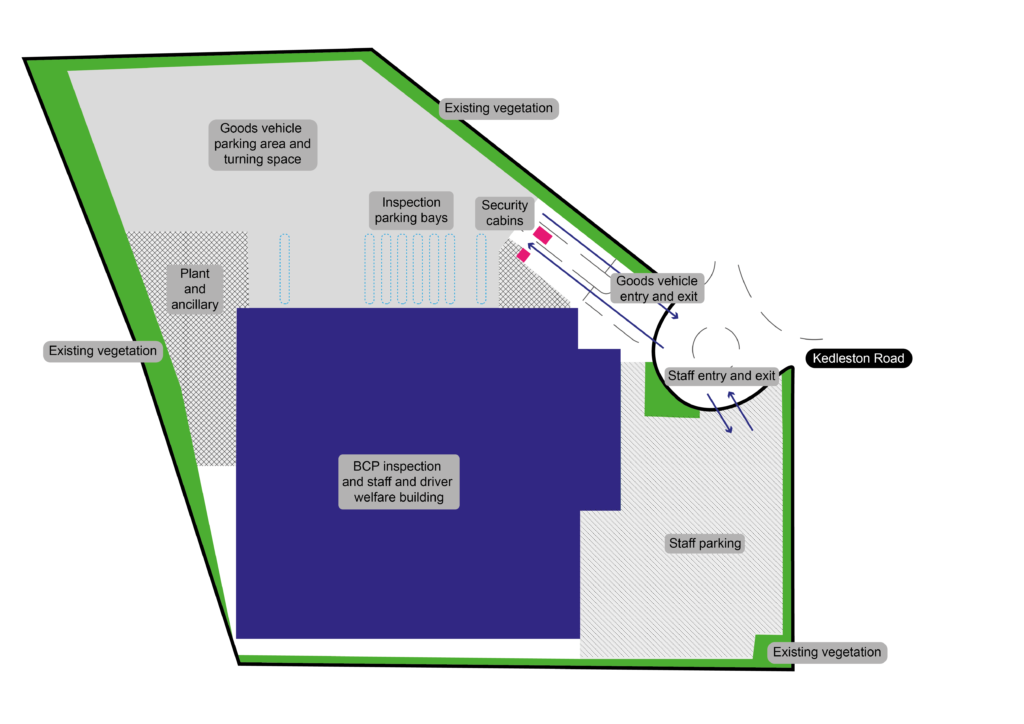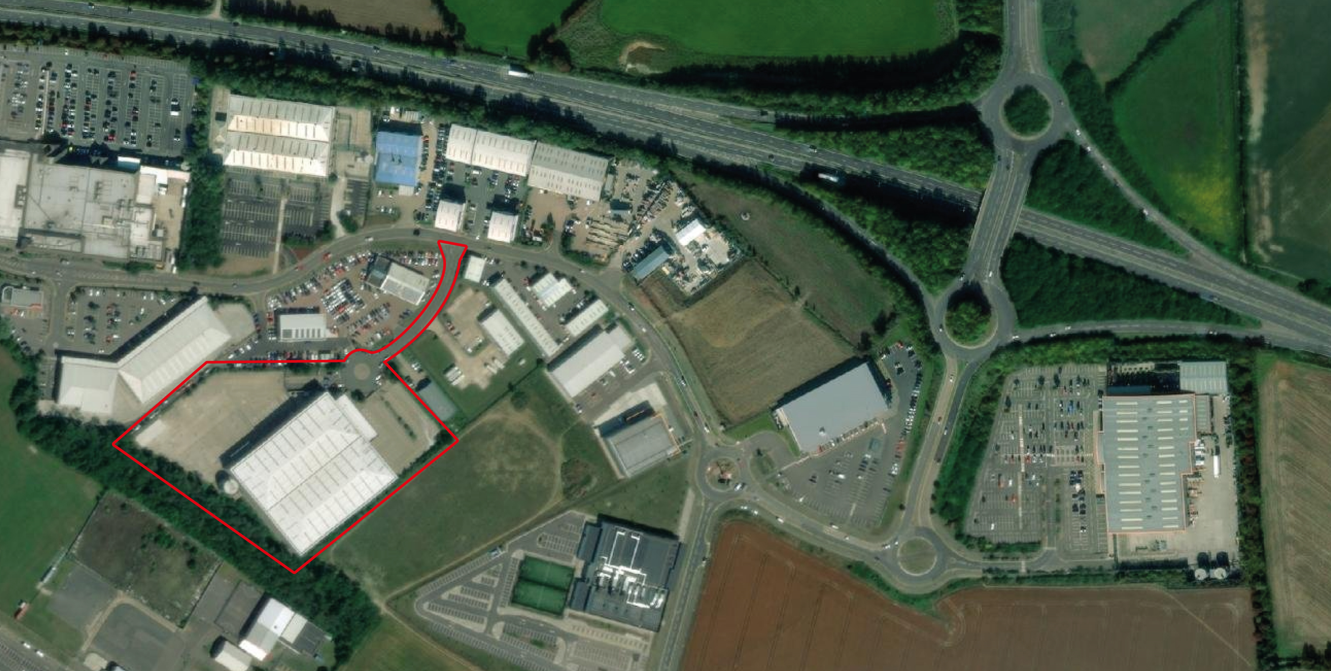Overview
The United Kingdom (UK) has left the European Union (EU) and new rules require certain exports and imports to be checked and inspected. Defra is the government department responsible for ensuring the biosecurity of the border and must ensure that the necessary checks can be undertaken on selected plants, produce and animals brought into the country. These are known as sanitary and phyto-sanitary (SPS) checks.
The decision notice relating to DLUHC’s approval of the article 4 SDO application (gained on 8th April 2022 until December 2025) is available to view here
Background
The Department for Environment, Food and Rural Affairs (Defra) is progressing plans for the Dover SPS Border Control Post (BCP).
The proposed BCP will be located on the White Cliffs Business Park, just outside Dover, Kent. It is accessible to the Port of Dover and the M2 motorway via the Whitfield Interchange between the A2 and the A256. It is an existing distribution warehouse with adjoining two- storey office block for staff and separate parking areas for HGVs and staff which will be brought back into use. The site is approximately two hectares.
The BCP operation will enable documentary and physical checks to take place. These include sanitary and phyto-sanitary (SPS) checks, customs and transit checks on consignments of Products of Animal Origin (POAO) e.g. food and also plant products entering the UK. These checks will be carried out by Dover Port Health Authority (Dover PHA), the Animal and Plant Health Agency (APHA) and Border Force.
Approval is needed for Defra’s proposed use and development of the site which Defra will seek under the Town and Country Planning (Border Facilities and Infrastructure) (EU Exit) (England) Special Development Order 2020 (the SDO).
The BCP proposal is designed to ensure that there are no significant or long-term environmental effects. An information leaflet which summarises the information shown on this website can be found here.
The proposed BCP is one of two government border facilities proposed; close to White Cliffs Business Park. Her Majesty’s Revenue and Customs (HMRC) is also submitting a proposal for an Inland Border Facility (IBF) known as Dover IBF on a separate site which will undertake customs checks.

How to comment on the proposals
This engagement period has now closed (at 23.59 on 14th February 2022).
Community Updates
News and updates for the local community regarding the Dover SPS Border Control Post are available to view below.
August 2022
A Construction Management Plan (CMP) has been developed and approved in advance of any construction works commencing on the main site. The CMP explains how construction works will be managed. It also ensures that possible impacts that may arise from those works have been appropriately identified and mitigated. The CMP can be viewed here
January 2022
An information leaflet which summarises the information shown on this website can be found here.
Construction and Operations
A Construction Management Plan (CMP) has been developed and approved in advance of any construction works commencing on the main site. The CMP explains how construction works will be managed. It also ensures that possible impacts that may arise from those works have been appropriately identified and mitigated. A non-technical summary of the CMP can be downloaded here
An Operational Management Plan (OMP) will be developed and will need to be approved in advance of the site operating. The OMP will explain the tasks involved in safely managing and operating the site in a manner to reduce the potential for any adverse impacts on site or locally. It provides a framework of guidance to all site users and describes in detail the arrangements for delivering the intended services. This will be uploaded in due course.
Why do we need Border Control Posts?
Defra is engaging with interested individuals and organisations to explain the need for BCPs. New rules on trade, travel and business were brought following the UK’s withdrawal from the EU. These require customs, transit, sanitary and phyto-sanitary (SPS) checks on commodities inbound to the UK. Most ports in the UK are building the BCPs within the existing port. The government pledged where there is no space at ports, new border infrastructure will be constructed where these checks and other activities will take place.
Access to the Dover BCP
Local roads
Traffic impacts on the local and strategic road network are being assessed and managed in conjunction with local and national stakeholders, this includes reviewing whether any local highway improvements are required, including the introduction of active travel measures. Where necessary, mitigation will be implemented through an Operational Management Plan (OMP).
When the site is operational, there will be regular monitoring of potential traffic effects on neighbouring roads caused by vehicles travelling to and from the Border Control Post (BCP). Again, where necessary, mitigation will be implemented through an OMP.
Lorry (HGV) Capacity
The overall parking capacity of the proposed BCP has been modelled by traffic consultants to ensure adequate parking and safe operation of the site during peak times. The site provides for up to 13 HGV parking bays.

Environment
Environmental studies will be completed and relevant bodies will be engaged about the use of the site as part of the proposal.
The BCP proposals are temporary under SDO. Requirements are designed to ensure no significant long-term environmental effects. Given the current temporary nature of the inland border infrastructure, Defra is looking to improve biodiversity on site where possible and is planning to develop an off-site biodiversity programme.
As part of the SDO submission, a study of the likely environmental effects report will be produced. This study will consider air quality, landscape and visual effects, biodiversity, drainage and water, and noise. The report will also consider geology and soils, material assets and waste, population and health, and climate.
The site will be operational 365 days a year and 24 hours a day, with night lighting required. Potential impacts of night lighting will be considered in the environmental assessments, and where required appropriate mitigation will be implemented to ensure no adverse effects.
Drainage
We are working with a range of stakeholders including the Environment Agency, Kent County Council and Southern Water to ensure the necessary measures are in place to manage surface water and protect groundwater from any potential pollution.
These measures will be further detailed in the Operational Management Plan (OMP).


How the site will operate
Subject to any approval, checks will commence on site from the 1st July 2022.
The site will operate 24/7. An Operational Management Plan (OMP) will explain how the site will be managed and operated safely. Fully trained staff will be working on the site in shift patterns. Closed circuit television (CCTV) cameras will be positioned across the site to monitor site activities.
On entering the site via the security gates, HGVs and other goods vehicles will be directed to the appropriate vacant HGV parking space, or inspection bay.
Checks will be carried out in inspection bays within the warehouse. HGVs will reverse into an inspection bay where a dock door is located, a rubber surround will be sealed around the rear of the vehicle allowing the check to be carried out inside the inspection building to remain bio-secure.
Checks on Products of Animal Origin (POAO) (food and produce) will be carried out by Dover Port Health Authority. Checks on plant and plant products will be carried out by the Animal and Plant Health Agency (APHA). Plant and plant products will only be checked if the HGV has been called for a dual (POAO and Plant and Plant Product) check.
Border Force will also operate on the site to facilitate customs checks.
Once the checks have been completed, the vehicles will be cleared to leave the site via the exit gates to continue on their journeys.
In addition to the above-mentioned agencies, the BCP operator and Defra Group Property will have a presence on site.
Covid-19
To limit risks from the Covid-19 virus; drivers will spend a limited time on site, there will be hot and cold running water, toilets, hand cleaning facilities and provision of drinking water. The site has been designed to take social distancing into consideration, and the latest Government guidelines on Covid-19 will be followed in all circumstances.

Highways and Transport
Traffic modelling
Defra intends to bring an existing vacant warehouse back into use as a BCP which will accommodate a similar level of vehicles as it did before. We expect that the vehicles travelling from the EU via the Port of Dover to the BCP would already be travelling along the A2/M2 route so will not be adding additional traffic to the strategic road network.
Defra is working closely with National Highways who manage the Strategic Road Network, and Kent County Council who will manage the local road network.
Traffic modelling is being undertaken and will be reported in the Transport Assessment. This will look at nearby junctions and access to the site via Honeywood Parkway and Kedleston Road. The traffic assessment will look to ensure there is no adverse impact created by the vehicles using the proposed BCP site.
When the site is operational, traffic movements will be monitored on neighbouring roads to observe potential traffic effects caused by vehicles travelling to and from the site. Where necessary, mitigation can be implemented through the operational process and the Operational Management Plan.
Traffic flow and access
Directing vehicles to the Border Control Post – The BCP will inspect consignments entering the UK from the EU via the Port of Dover. HGVs will use the elevated Jubilee Way to exit the port and continue northbound on the A2, following signs for Canterbury and the M2. The Dover BCP will be signposted via the westbound off-slip from the A2 at Whitfield Interchange.
HGV traffic will access the BCP via Kedleston Road and Honeywood Parkway via the Whitfield Interchange on the A2 (junction with the A256).
Prominent road signage
Prominent road signage will be located on the route from the Port of Dover along the A2 corridor for those HGV drivers required to report to the BCP. There will also be signs outside the site entrance to advise about the facilities on site. We are also working closely with HMRC colleagues and the highways authorities to develop an effective signage strategy.
Proposed works
The BCP will utilise the existing warehouse building on the site to carry out checks. Minimal external works are proposed to take place, to bring the site back into use as a BCP. It is anticipated that these works would include minor works to the building, new heating and cooling plant for the warehouse and additional security cabins at the entrance.
Planning and next steps
Approval for the site will be sought under the requirements of a Special Development Order (SDO).
The SDO was laid in Parliament on 3 September 2020 (The Town and Country Planning (Border Facilities and Infrastructure) (EU Exit) (England) Special Development Order 2020) and came into force on 24 September.
The order grants temporary planning permission, subject to conditions, to government border departments of which Defra is one. This is to use land and provide facilities in connection with border processing activities in specified local authority areas for the stationing and processing of HGVs and consignments entering or leaving the UK. It also allows for the provision of associated temporary facilities and infrastructure.
The legislation states that planning permission granted under the SDO will cease on 31 December 2025, and the site is to be reinstated by 31 December 2026. Should the site be required for longer, a full planning application will be submitted.
The 2020 SDO can be viewed here.
Next steps
Defra must submit a request to the Secretary of State for Levelling Up, Housing and Communities for approval for the proposed use of the land and operations (relevant approval under Article 4 of the SDO).
A number of separate documents are required as part of the submission:
- Site boundary plans
- Site access plans
- Confirmation of site duration use
- A report considering the likely environmental effects and appropriate mitigation proposals.
- A Transport Statement
- A Stakeholder Engagement Report
- A Planning Statement (including a description of the proposed development and its intended uses, planning context, application of relevant national and local planning policies, assessment of the relevant planning issues and any other material considerations which are relevant, along with compliance with Human Rights and Equalities Legislation).
Further subsequent details will also need to be submitted to the Secretary of State for Levelling Up, Housing and Communities, following the Article 4 Submission, including:
- A Construction Management Plan
- An Operational Management Plan
Frequently asked questions
What is a Border Control Post?
The Dover BCP site will carry out sanitary and phyto-sanitary (SPS) checks on Products of Animal Origin (POAO) and plant and plant products entering the UK via the Port of Dover. These checks are to ensure biosecurity of the UK following the UK’s departure of the EU. The BCP will bring an existing site, which includes; a warehouse, adjoining two storey office and parking for HGVs and staff, back into use to carry out these checks.
What is biosecurity and why is it important?
Biosecurity refers to measures aimed at preventing harmful pests and disease entering the UK. Maintaining the UK’s biosecurity helps to protect the health of our plants and trees as well as our agriculture, horticulture and food sectors.
What’s the difference between the Dover Inland Border Facility and the Dover Border Control Post?
The proposed Dover IBF will be located to the east of the Dover BCP and south of B&Q. Dover IBF will carry out customs checks, comprising documentary and physical inspections of goods entering and leaving the country including document checks on consignments covered by the Convention on International Trade in Endangered Species of Wild Fauna and Flora (CITIES) and market surveillance. The site will be developed by HMRC.
The proposed Dover BCP will be located in an existing vacant warehouse on Kedleston Road and carry out sanitary and phyto-sanitary checks on Products of Animal Origin (POAO) (food and produce) and plant and plant products. The site will be developed by Defra.
HMRC and Defra intend to submit separate requests for approval under the Special Development Order (SDO). Defra and HMRC are and will work closely together to minimise impacts when developing and operating these sites. Consideration has been made to how traffic attending the sites will be managed, this includes plans to produce a joint signage strategy to ensure vehicles attend the correct site, and the presence of Border Force on both sites to carry out customs checks, removing the need for vehicles to attend both sites.
This engagement is for the Defra site. It is anticipated that Defra will submit their proposal in early 2022.
Will construction and operation of the site impact local communities?
The proposed BCP will be located at an existing warehouse on White Cliffs Business Park. HGVs that access the site will not be directed past any residential properties.
How many staff will be on site?
The number of staff needed on site will be determined as part of the OMP, which will explain how the site will be managed and operated safely.
What goods will be checked at the BCP?
The BCP will check Products of Animal Origin (POAO) which includes food such as meat and dairy products, animal feed and allergens such as nuts. Plant and plant products checked at the BCP will include flowers, trees and other plants.
Why this location?
With its location on the A2, approximately 3 miles (5km) from the Port of Dover, 50 miles (80km) from the M25 and just under 70 miles (110km) from Central London, the site provides direct connectivity to the Port of Dover and the Strategic Road Network.
When will construction work start?
The BCP will utilise an existing warehouse which is currently vacant. Defra intends to bring the warehouse back into use as a BCP. Essential repairs to the building and measures to secure the site are currently underway. Defra intends to submit a proposal under a Special Development Order (SDO) for the change of use of the building and any works that require planning permission.
When is the Border Control Post going to be operational?
We expect the BCP to be operational from July 2022.
Will consignments be unloaded at the Border Control Post?
Loads requiring an inspection will be inspected within the inspection building to ensure biosecurity.
What type of vehicles are expected to use the Border Control Post?
The BCP will be used by goods vehicles that will comprise HGVs, cars and vans, including staff vehicles.
Documents
- Dover BCP Stakeholder Letter
- Dover SPS Border Control Post Leaflet
- Dover BCP SPS – Construction Environmental Management Plan – Non Technical Summary
- Dover BCP Decision Notice
How we use your information
Data controllers and processors
The Department for the Environment, Food and Rural Affairs (Defra) are the data controllers. Data Protection Officers can be contacted at:
Defra: data.protection@defra.gov.uk
Why we are collecting data
Your personal data is being collected to support the inland border facilities Special Development Order (SDO) planning submissions.
To support site specific planning proposals for new inland border facilities from the 1 January 2021, stakeholder engagement is required. To ensure that proposals have been considered and informed by the engagement process, Article 4(2)(j) of the Town and Country Planning (Border Facilities and Infrastructure) (EU Exit) England Special Development Order 2020 requires that a report summarising the engagement with
stakeholders is submitted to the Secretary of State as part of the approval process. As part of this stakeholder engagement process you are being invited to participate via a contact form and website equivalent.
Although we are not specifically asking for your personal data as part of this you may provide your name and contact details so we can contact you. You do not have to give us any personal information to participate in the stakeholder engagement process but any personal data you do provide will be used for this purpose only.
Legal basis for processing the data
The data protection legislation sets out when we are lawfully allowed to process your data. The lawful basis that applies to this processing is that it is necessary for the performance of a task carried out in the public interest in accordance with Article 6(1)(e).
With whom we will be sharing the data
Department of Levelling Up, Housing and Communities (DLUHC), Department for Environment, Her Majesty’s Revenue and Customs (HMRC), Department for Transport (DfT), Department for Business, Energy & Industrial Strategy (BEIS), Border Protocol Delivery Group (BPDG) and any external department consultants are the data handlers.
For how long we will keep the personal data, or criteria used to determine the retention period
Your personal data will be held for 24 months and then securely destroyed.
Your rights, e.g. access, rectification, erasure
The data we are collecting is your personal data, and you have rights that affect what happens to it. You have the right to:
- know that we are using tour personal data
- see what data we have about you
- ask to have your data corrected, and to ask how we check the information we hold is accurate
- complain to the ICO (see below)
Sending data overseas
The feedback form is being hosted by Smart Survey. All data is stored and backed up on UK/EU-based servers.
Defra has taken all necessary precautions to ensure that your rights in terms of data protection will not be compromised by this.
Automated decision making
We will not use your data for any automated decision making.
Storage, security and data management
Following the close of the stakeholder engagement process, your personal data will be moved from Smart Survey to a secure Government IT system.
Complaints and more information
When we ask you for information, we will keep to the law, including the Data Protection Act 2018 and General Data Protection Regulation.
If you are unhappy with the way DEFRA has acted, you can make a complaint:
Complaints procedure – Department for Environment, Food & Rural Affairs. If you are not happy with how we are using your personal data, you should first contact
Defra: data.protection@defra.gov.uk
If you are still not happy, or for independent advice about data protection, privacy and data sharing, you can contact:
The Information Commissioner’s Office, Wycliffe House, Water Lane, Wilmslow, Cheshire. SK9 5AF
Telephone: 0303 123 1113 or 01625 545 745
https://ico.org.uk